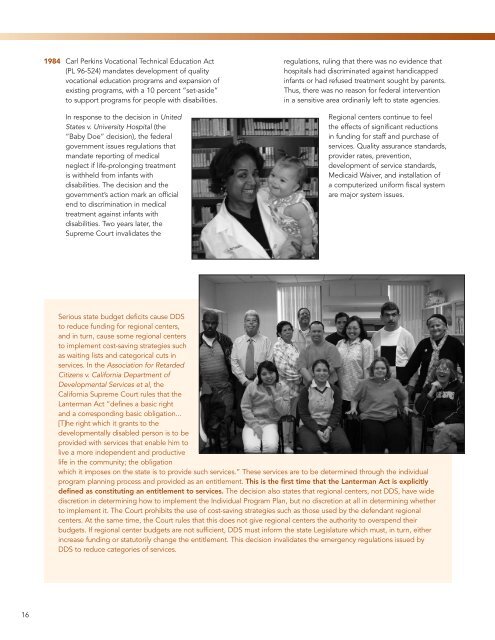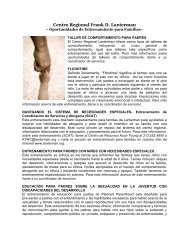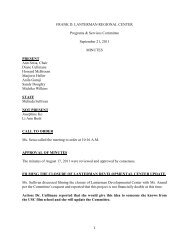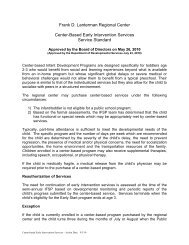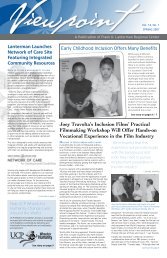40th History Brochure-r2 - Frank D. Lanterman Regional Center
40th History Brochure-r2 - Frank D. Lanterman Regional Center
40th History Brochure-r2 - Frank D. Lanterman Regional Center
You also want an ePaper? Increase the reach of your titles
YUMPU automatically turns print PDFs into web optimized ePapers that Google loves.
1984 Carl Perkins Vocational Technical Education Act(PL 96-524) mandates development of qualityvocational education programs and expansion ofexisting programs, with a 10 percent “set-aside”to support programs for people with disabilities.In response to the decision in UnitedStates v. University Hospital (the“Baby Doe” decision), the federalgovernment issues regulations thatmandate reporting of medicalneglect if life-prolonging treatmentis withheld from infants withdisabilities. The decision and thegovernment’s action mark an officialend to discrimination in medicaltreatment against infants withdisabilities. Two years later, theSupreme Court invalidates theregulations, ruling that there was no evidence thathospitals had discriminated against handicappedinfants or had refused treatment sought by parents.Thus, there was no reason for federal interventionin a sensitive area ordinarily left to state agencies.<strong>Regional</strong> centers continue to feelthe effects of significant reductionsin funding for staff and purchase ofservices. Quality assurance standards,provider rates, prevention,development of service standards,Medicaid Waiver, and installation ofa computerized uniform fiscal systemare major system issues.Serious state budget deficits cause DDSto reduce funding for regional centers,and in turn, cause some regional centersto implement cost-saving strategies suchas waiting lists and categorical cuts inservices. In the Association for RetardedCitizens v. California Department ofDevelopmental Services et al, theCalifornia Supreme Court rules that the<strong>Lanterman</strong> Act “defines a basic rightand a corresponding basic obligation...[T]he right which it grants to thedevelopmentally disabled person is to beprovided with services that enable him tolive a more independent and productivelife in the community; the obligationwhich it imposes on the state is to provide such services.” These services are to be determined through the individualprogram planning process and provided as an entitlement. This is the first time that the <strong>Lanterman</strong> Act is explicitlydefined as constituting an entitlement to services. The decision also states that regional centers, not DDS, have widediscretion in determining how to implement the Individual Program Plan, but no discretion at all in determining whetherto implement it. The Court prohibits the use of cost-saving strategies such as those used by the defendant regionalcenters. At the same time, the Court rules that this does not give regional centers the authority to overspend theirbudgets. If regional center budgets are not sufficient, DDS must inform the state Legislature which must, in turn, eitherincrease funding or statutorily change the entitlement. This decision invalidates the emergency regulations issued byDDS to reduce categories of services.16


